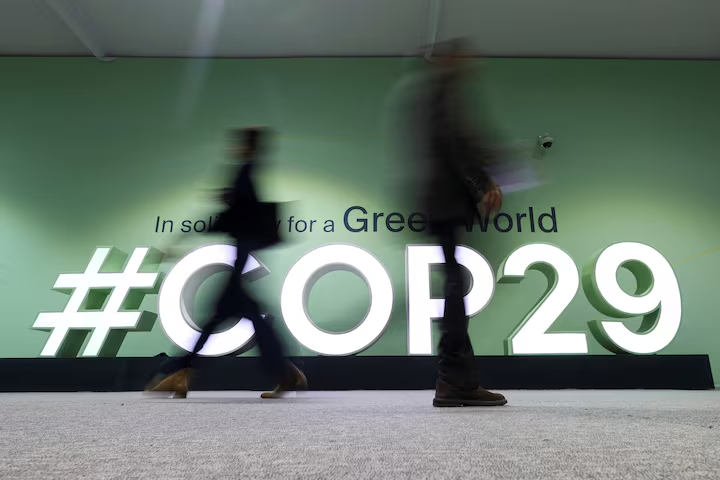COP29, convened under the United Nations Framework Convention on Climate Change (UNFCCC), reflects humanity’s collective struggle against climate change. As climate impacts worsen, the urgency for consensus on critical issues intensifies. However, the conference has encountered significant hurdles, with little agreement on financing mechanisms for loss and damage, timelines for phasing out fossil fuels, and the equitable distribution of climate burdens.
This led to a walkout by Small Island Developing States (SIDS). The walkout highlighted the deepening divide between vulnerable nations and major emitters, as well as the perceived inadequacies of developed countries in addressing their historical responsibilities.
Core Issues Contributing to the Deadlock
Loss and Damage Financing
The issue of compensating vulnerable nations for climate-induced loss and damage has remained contentious. Developing nations, particularly Small Island Developing States (SIDS) and least developed countries (LDCs) demand the operationalization of a dedicated fund agreed upon at COP28. Developed nations, while supportive in principle, have hesitated to commit to substantial contributions, citing economic pressures and the need for private-sector engagement.
Fossil Fuel Phase-Out
A significant divide exists over language surrounding the phase-out of fossil fuels. Countries heavily reliant on fossil fuel exports, including Saudi Arabia and Russia, have resisted binding commitments, advocating instead for carbon capture technologies. Meanwhile, progressive coalitions, such as the European Union and Pacific Island nations, demand a clear timetable for phasing out oil, coal, and gas.
Equity and Responsibility
The principle of Common but Differentiated Responsibilities and Respective Capabilities (CBDR-RC) continues to polarize stakeholders. Developing nations argue that historically high emitters in the Global North should bear a disproportionate share of climate action costs. Conversely, developed nations emphasize that emerging economies, including China and India, now rank among the largest greenhouse gas emitters and should also take ambitious steps.
Implications for Climate Action
Delayed Implementation of Climate Finance
The stalemate jeopardizes the fulfillment of climate finance pledges, undermining the trust of vulnerable nations. Without adequate funding, these nations face escalating climate adaptation and recovery costs, exacerbating socio-economic inequalities.
Global Warming
Failure to agree on fossil fuel phase-out measures threatens to lock the world into a high-carbon trajectory. Current nationally determined contributions (NDCs) are insufficient to meet the 1.5°C target, and the lack of consensus may embolden major emitters to delay transitions to renewable energy.
Erosion of Multilateral Cooperation
The impasse undermines the credibility of the UNFCCC process. Perceived inequities in burden-sharing could lead to fragmentation, where nations prioritize bilateral or regional agreements over collective global action. This risks a “race to the bottom” in climate ambition.
Potential Pathways Forward
Strengthening Multilateral Trust
To overcome the deadlock, developed nations must demonstrate leadership by fulfilling existing financial commitments, such as the $100 billion annual climate finance target. Transparent mechanisms for loss and damage financing, coupled with private-sector partnerships, could bridge funding gaps.
Enhanced Role of Emerging Economies
Emerging economies must actively participate in global climate action by committing to renewable energy transitions and emissions reductions. Conditional financial and technological support from developed nations could incentivize bolder steps.
Inclusive Dialogue and Adaptive Frameworks
The UNFCCC must adopt a more inclusive and adaptive negotiation framework that accommodates divergent priorities. Mediation and compromise, particularly on contentious issues like fossil fuel reliance, could foster incremental progress.
Conclusion
The deadlock at COP29 epitomizes the complex interplay of politics, economics, and ethics in global climate governance. While the absence of consensus on cardinal issues threatens short-term progress, it also underscores the need for renewed commitment to multilateralism. The stakes of inaction are existential, with far-reaching consequences for ecosystems, economies, and human well-being. Breaking the impasse will require unprecedented cooperation, innovation, and political will.
The walkout by Small Island Developing States marks a critical juncture in global climate governance. While these events reflect deep frustrations, they also offer an opportunity to address systemic inequities and recalibrate the multilateral process.
The outcomes of COP29 will shape the trajectory of climate action and test the resilience of international diplomacy in addressing one of the greatest challenges of our time.

